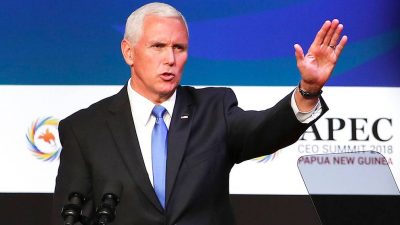US and China Clash at the APEC Summit. “Very Tense”. Towards the Rupture of Asia-Pacific Trade Structures

Trump declined to attend the November 17 – 18 Papua New Guinea Asia-Pacific Economic Cooperation (APEC) summit.
Nor did he attend the November 11 Association of Southeast Asian Nations (ASEAN) summit in Singapore. Mike Pence and John Bolton attended in his place.
According to Singaporean diplomat Tommy Koh, “(t)o Asians, turning up for a meeting is significant,” adding major Sino/US disagreements on trade and other issues are unsettling for Asia/Pacific leaders.
The just concluded APEC summit focused heavily on major Sino/US differences on trade, investments, and security issues.
Malaysian Prime Minister Mahathir Mohamad criticized regional globalization-fueled inequality, saying:
“The benefits of free and fair trade and economic integration have been ruptured, exemplified by Brexit and trade wars between major economies,” adding:
“The trade war between the US and China has amplified further the disruption to our trade and commerce.”
Other APEC leaders slammed harmful America first protectionism. Washington’s idea of free trade isn’t fair.
For the first time, APEC leaders failed to agree on a joint communique, senior Chinese diplomat Zhang Xiaolong saying:
“The leaders agreed that instead of a traditional leaders’ declaration, they would leave it to the hands of PNG as the chair to issue a chair statement on behalf of all the members to capture the consensus” – omitting controversial issues, largely major Sino/US disagreements.
Beijing denied accusations that its officials tried to pressure summit leaders to issue a final communique according to what China wanted said.
According to host country leader Peter O’Neill, insistence by the US to have consensus in the final statement, calling for WTO reform (suiting US interests) was the main bone of contention – why a “chair’s statement” substituted for a customary final communique agreed on by all leaders.
Trump earlier threatened to pull out of the WTO, falsely claiming it unfairly favors China. O’Neill explained that APEC leaders have no say over WTO operations.
According to an unnamed APEC diplomat, last minute talks were “very tense…(W)e couldn’t come to an agreement on certain trade issues. The gulf was too big. The US and China could not see eye to eye.”
Pence vowed to maintain US pressure on China, saying bilateral differences “begin with trade practices, with tariffs and quotas, forced technology transfers, the theft of intellectual property. It goes beyond that to freedom of navigation in the seas (and) concerns about human rights.”
On all of the above, the US, far and away, is the leading global offender. No other nation comes close to matching its abusive practices, demanding all other nations bend to its will, waging endless wars of aggression to force other nations to be submissive to US interests.
Its geopolitical toughness alienates countries. On Saturday, Pence demanded China change its ways, saying
“(w)e put tariffs on $250 billion in Chinese goods, and we could more than double that number.”
China’s Xi Jinping said
“(a)ttempts to erect barriers and cut close economic ties work against the laws of economics and the trends of history. This is a short-sighted approach and it is doomed to failure,” adding:
“We should say no to protectionism and unilateralism. History has shown that confrontation – whether in the form of a cold war, hot war or trade war – will produce no winners.”
Other APEC leaders criticized Trump’s America first agenda, including unacceptable illegal sanctions as a way to try forcing other nations to bow to US demands – a failed tactic every time tried.
China’s Global Times slammed Pence’s hostile remarks, saying they offered “nothing new,” adding:
“He repeated the US’ hardline approach in its trade conflicts with China, reiterated the US’ determination of freedom of navigation, and criticized China’s foreign aid and cooperation with other countries.”
He lied saying
“(w)e don’t coerce, corrupt, or compromise your independence. The United States deals openly and fairly.”
Hardline/self-serving US geopolitical policies are polar opposite what Pence claimed, wanting other nations transformed into US vassal states, serving its interests at their expense – how Washington operates globally.
*
Note to readers: please click the share buttons above. Forward this article to your email lists. Crosspost on your blog site, internet forums. etc.
Award-winning author Stephen Lendman lives in Chicago. He can be reached at [email protected]. He is a Research Associate of the Centre for Research on Globalization (CRG)
His new book as editor and contributor is titled “Flashpoint in Ukraine: US Drive for Hegemony Risks WW III.”
http://www.claritypress.com/LendmanIII.html
Visit his blog site at sjlendman.blogspot.com.
Featured image is from Channel NewsAsia

